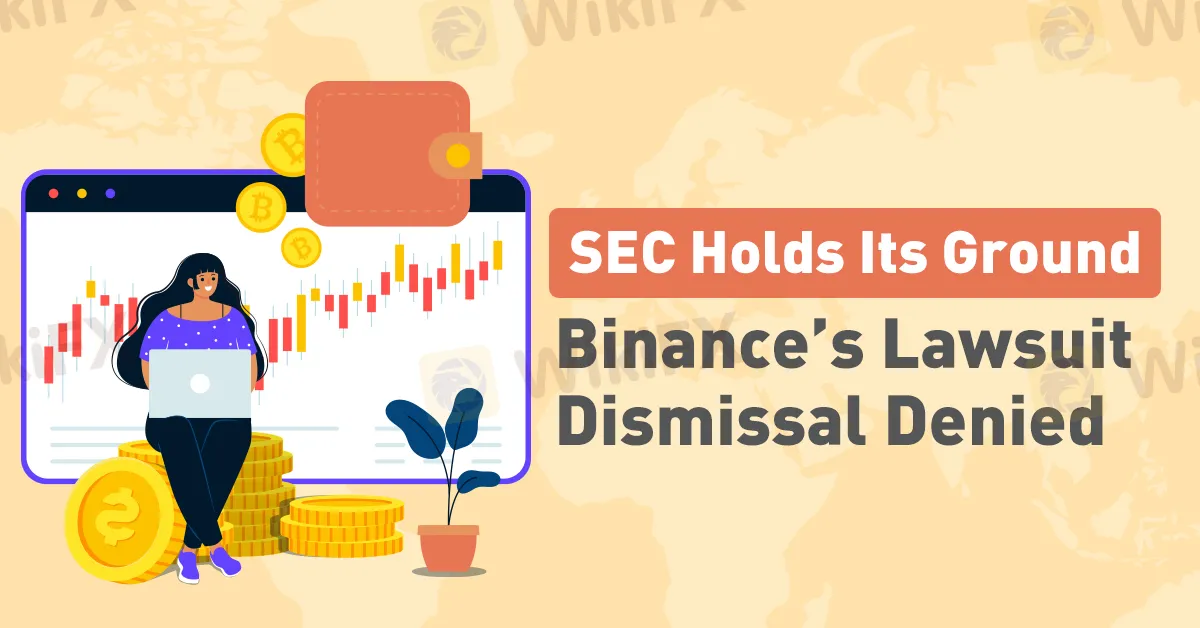简体中文
繁體中文
English
Pусский
日本語
ภาษาไทย
Tiếng Việt
Bahasa Indonesia
Español
हिन्दी
Filippiiniläinen
Français
Deutsch
Português
Türkçe
한국어
العربية
SEC Holds Its Ground, Binance’s Lawsuit Dismissal Denied
Abstract:The U.S. Securities and Exchange Commission (SEC) takes on Binance's bid to dismiss a lawsuit, citing legal deficiencies and raising questions about unregistered securities in this unfolding financial drama.

The U.S. Securities and Exchange Commission (SEC) has issued a robust response to Binance's endeavour to dismiss the lawsuit it faces, contending that such a move lacks a solid legal foundation. The SEC's legal battle with Binance, initiated in June, revolves around allegations that the platform had offered unregistered securities to the public.
In a filing submitted on a recent Wednesday, the SEC firmly rebuffed Binance and Binance.US's attempts to have the lawsuit, previously filed during the summer, summarily dismissed. The regulatory authority firmly asserted that Binance's motion relies on interpretations of federal law and legal precedents that are, in its view, “distorted” and “tortured.”
The SEC's original lawsuit, filed in June, not only accused both Binance and Coinbase of offering unregistered securities to the public but also presented additional allegations against Binance.
In its recent submission, the SEC argued that Binance's arguments, if accepted, would effectively undermine the foundational precedents upon which the nation's securities laws have been built over decades. Such acceptance would establish a new and unfounded “rigid framework” that contradicts well-established legal precedents and existing legislation.

Among the SEC's contentions, it asserted that Binance's sale of the BNB token via an initial coin offering as a fundraising mechanism violated securities laws, as did the sale of Binance USD (BUSD) as an investment contract. The regulatory agency also contended that Binance's staking and earn programs were in violation of federal securities laws.
Furthermore, the SEC rejected an argument put forth by Binance concerning the “Major Questions Doctrine,” a principle that stipulates clear congressional authorization for specific agency actions. In recent times, this doctrine has become a crucial defense for crypto companies, as they argue that the SEC's actions require more explicit backing from legislators.
In a separate development earlier this month, Binance's U.S. affiliate sought a court order to protect itself from what it deemed an improper “fishing expedition” by the SEC. The protective order requested by Binance aims to place limits on the number of employees that the SEC can question, excluding key figures like CEO Changpeng “CZ” Zhao. Binance contends that its senior executives lack unique firsthand knowledge about the circumstances surrounding the security, custody, and transfer of customer assets.
The order would also confine the scope of questioning to matters directly pertinent to the consent order and prohibit requests for communications on subjects beyond customer assets.
Back in June, the U.S. branch of Binance, operating under BAM Trading Services and BAM Management US Holdings, consented to an agreement with the SEC following the agency's bid to freeze all of its assets. However, according to Binance's recent filing, the SEC's demands for discovery extend far beyond the previously agreed-upon terms, with Binance asserting that these demands are not relevant to the ongoing investigation.

Disclaimer:
The views in this article only represent the author's personal views, and do not constitute investment advice on this platform. This platform does not guarantee the accuracy, completeness and timeliness of the information in the article, and will not be liable for any loss caused by the use of or reliance on the information in the article.
Read more

Why the SEC Rejected the First U.S. Bank-Issued Stablecoin
The SEC rejected the first U.S. bank-issued stablecoin, citing regulatory concerns. This decision highlights the ongoing challenges in crypto asset classification and oversight.

UK Authorities Freeze Nearly $7.7 Million in Illicit Crypto Assets Within a Year
Crypto wallets tied to fraud and tax evasion were frozen under new enforcement powers granted in 2024.

Australian Authorities Joins Forces with Philippine Authorities to Combat Cyber Scams
AFP tackles cyber scam boiler rooms in the Philippines, training police to fight fraud and protect Australians from romance and cryptocurrency scams.

Steam Set to Launch Blockchain Game “Paradise” Amid Scam Allegations
“Paradise,” a blockchain-based game accused of being a crypto scam, is set for release on Steam, sparking concerns over platform’s ban enforcement and consumer risks.
WikiFX Broker
Latest News
FCA Warns Against 10 Unlicensed or Clone Firms
CySEC Warns Against 14 Unlicensed Investment Websites
Top Currency Pairs to Watch for Profit This Week - March 31, 2025
Will natural disasters have an impact on the forex market?
Philippines Deports 29 Indonesians Linked to Online Scam Syndicate in Manila
Exposing the Top 5 Scam Brokers of March 2025: A Closer Look by WikiFX
Gold Prices Climb Again – Have Investors Seized the Opportunity?
Webull Launches SMSF Investment Platform with Zero Fees
Australian Regulator Warns of Money Laundering and Fraud Risks in Crypto ATMs
AI-Powered Strategies to Improve Profits in Forex Trading
Currency Calculator







